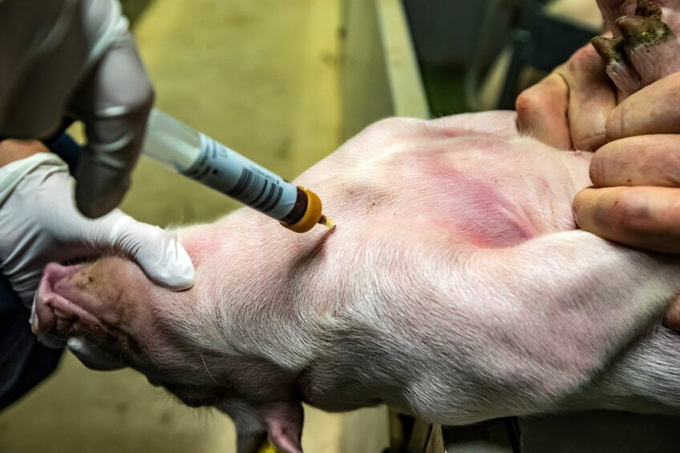November 27, 2025 | 23:35 GMT +7
November 27, 2025 | 23:35 GMT +7
Hotline: 0913.378.918
November 27, 2025 | 23:35 GMT +7
Hotline: 0913.378.918
The wait is now for an approval of the US Food & Drug Administration (FDA).

Photo: Ronald Hissink
The research project involves gene editing, a suitable application to use in cases where a single gene is involved; in this case, knocking out a single gene for the production of the surface protein. These gene edits result in pigs that lack a protein on their cell surfaces which enables entry of the PRRS virus.
ALSO READ: Interview Dr Lucina Galina (PIC): Searching for a solution to PRRS via genetics
Genus geneticists reported about the latest development in a new scientific paper, published in The CRISPR Journal, a peer-reviewed title dedicated to gene editing.
The team “produced healthy pigs that resisted PRRS virus infection as determined by macrophage and animal challenges. This founder population will be used for additional disease and trait testing, multiplication and commercial distribution upon regulatory approval.”
The team completed the gene edit by injecting pig zygotes (fertilised eggs) with Streptococcus pyogenes bacteria with the gene editing complex CRISPR-Cas9 and ribonucleoprotein (RNP).
This involved the synchronising of the oestrous cycles of donor and surrogate gilts. Donor animals were artificially inseminated twice. About 16 hours later, presumptive zygotes were harvested and injected with the RNP/Cas9, and donor sows were then inseminated.
In their paper the team noted that “generation of this founder population was not without challenges” (for example, only about 20% of pigs carried the intended commercial edit).
In relation to Genus activities, Prof Alison Van Eenennaam, cooperative extension in animal genomics and biotechnology at University of California, Davis, noted recently in a US media outlet that to move to commercial breeding of these pigs across the industry, the gene edit must be introduced into all of the parent lines that make up the four-way cross that’s common in many breeding programmes.
These are the Duroc, Landrace, Large White and the ‘synthetic’ grandparent stock. Furthermore, a homozygous gene edit (both DNA strands) is needed.
To do this, Genus has determined it needed to edit 10 to 20 ‘high genetic merit’ pigs in each of the 4 parent lines.
(PP)

(VAN) A new study reveals how the simultaneous effects of ocean acidification, salinity and loss of oxygen are making the world more fragile.

(VAN) Hopes are growing that the creation of the first 3D turkey gut model could be a turning point in the battle against the virulent blackhead disease.

(VAN) Tyson, America’s biggest meat supplier, plans to shutter one of its largest beef processing plants as the industry continues to struggle with low cattle supplies and political pressure from Washington.

(VAN) New FAO study shows how digital solutions are empowering farmers and fishers to prevent losses and build resilient agrifood systems.

(VAN) Brazil's COP30 presidency pushed through a compromise climate deal on Saturday that would boost finance for poor nations coping with global warming but that omitted any mention of the fossil fuels driving it.

(VAN) Poultry farmers in the UK have been warned that they could face one of the worst winters yet for bird flu.

(VAN) Prices of main-crop paddy have risen sharply, with jasmine rice hitting 16,100 baht per tonne — the highest level in years.